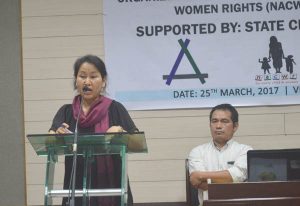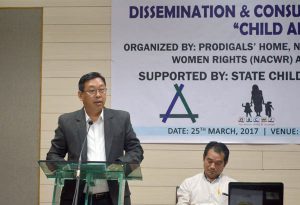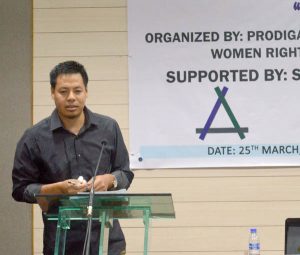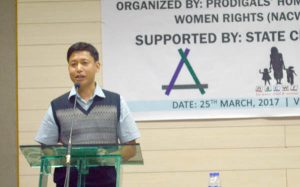Nagaland
Adoption in Nagaland: The Naga way and statutory imperatives

Staff Reporter
Dimapur, March 25 (EMN): In Nagaland, adoption of children is an issue of concern involving complex procedures and situations that require an understanding of the local socio-cultural conventions that govern the Naga community. It requires one to have clarity, says K Ela, director of Dimapur-based nongovernmental organisation Prodigals’ Home.

The Naga people have their own customs and traditions governing the lives of Naga citizens in all aspects including adoption of children. However an ‘adopted’ child is neither adopted in the true traditional spirit of the Naga neither is it so according to Central Adoption Resource Authority (CARA) guidelines of adoption, though many families claim to have adopted a child the Naga customary way, Ela said during a programme in the city on Saturday.

According to the social activist, there is rampant violation of child rights in the name of ‘adoption’ which required redress at the earliest. There also exists confusion between ‘adoption’ and ‘foster parenting / care’ in the Naga context; it need clarity, Ela said.
The director of Prodigals’ Home was addressing a workshop on child adoption. The workshop was organised by Prodigals’ Home, Nagaland Alliance for Children and Women Rights and local newspaper The Morung Express on Saturday, March 25. The programme was conducted at the Elim hall of the Dimapur Ao Baptist Arogo complex.
The workshop was supported by the State Child Protection Society of Kohima.

To address the issue within local contexts, Ela propounded proper understanding; and documentation of Naga customary practices around child adoption and to see how it promotes the best interest of the child and society. She put forward a proposal for a state policy on child adoption that would take the best of Naga customary practices which she said was the need of the hour.
Also, K Ela quoted SCPS SARA’s “Adoption is an act of love but the process comes from law.” She listed the issues and challenges for deliberation: ignorance of adoption procedures-both customary practices and CARA Regulations, illegal adoption from unauthorised sources, stigmatisation and discrimination of adopted children, child trafficking, maintaining secrecy of child adoption, unwed mothers and boys adoption challenges in Naga society. She also wondered whether Nagaland should go the customary way or follow the CARA regulations for adoption.
N.T.Kikon, director of Wondang-Ki Charitable Foundation in Dimapur, addressed the programme too. He said that in Nagaland, the adoption of a girl is preferred over boys for various superstitions and fear involving adopted males.
The belief that an adopted son would dominate its adoptive family in course of time, or that the male child would one day go back to his roots create apprehension in people who wish to adopt male children, said Kikon.
On this fixed idea of adoption, Kikon wondered about the future of Naga male children if the preference for the female child over males persists in the Naga society.
Highlighting the practice of 15 tribes in Nagaland when adopting, Kikon said that it usually involves closest kin adoption, children born out of wed lock, orphans and adoption for service. He pointed out that it was time to seriously decide whether Nagaland ought to uphold customary practices or move forward with the rest of the world on legal adoption which provides safeguards to all those involved in adoption.
On the other hand Dr. Asangba Tzüdir, editor of Heritage Publishing House in Dimapur, remarked that a larger issue related to ‘identity adoption’ was being ignored and customary adoption was still a debated concept.
‘Our culture is such that adoption should be based on our indigenous / customary practice and not on central guidelines,’ he opined.
In his opinion, once a child gets adopted, they get a dual identity and therefore the state needs to have a blend of legal and culture practices with a clause for intervention from the state government.
Also, MS Thangpong, deputy passport officer at Passport Seva Kendra in Dimapur asserted that birth certificates in Nagaland are effortlessly obtained compared to other states in the country as per reports. Dwelling on the role of regional passport offices in inter-country adoption, Thangpong underlined four categories of inter-country adoption process: The Hindu Adoptions and Maintenance Act (HAMA), 1956, The Guardians and Wards Act, 1890, Juvenile Justice (Care and Protection of Children) Act of 2000 and Juvenile Justice (Care and Protection of Children) Amendment Act of 2006.
The State Adoption Resource Agency (SARA) is the executive arm of a state government which regulates the adoption process under CARA, said Renchumi Imti, SARA program manager of the State Child Protection Society (SCPS) of Kohima.
Highlighting the main functions of the CARA adoption regulations of 2017, Imti said it was based on non-institutional care through sponsorship, foster care, adoption and aftercare. Also, she said that there were 67 childcare institutions in Nagaland and four Specialised Adoption Agency (SAA) in the state.
“Blind implementation of central laws is dangerous,” remarked P Leonard Aier, the principal of City Law College in Dimapur. Referring to Juvenile Justice Act of 2015, Aier suggested that if a law goes against ‘customary practices of Naga people’ than ‘it is better not to be implemented.
‘If such law is to dilute our practices, our children are at danger,’ he claimed.
“Adoption must not have the effect of destroying our biological rights and what we do today must have positive effect for the future,” he said.
‘Let the rights of vote and inheritance go to a Naga because consequences is imperative.’

